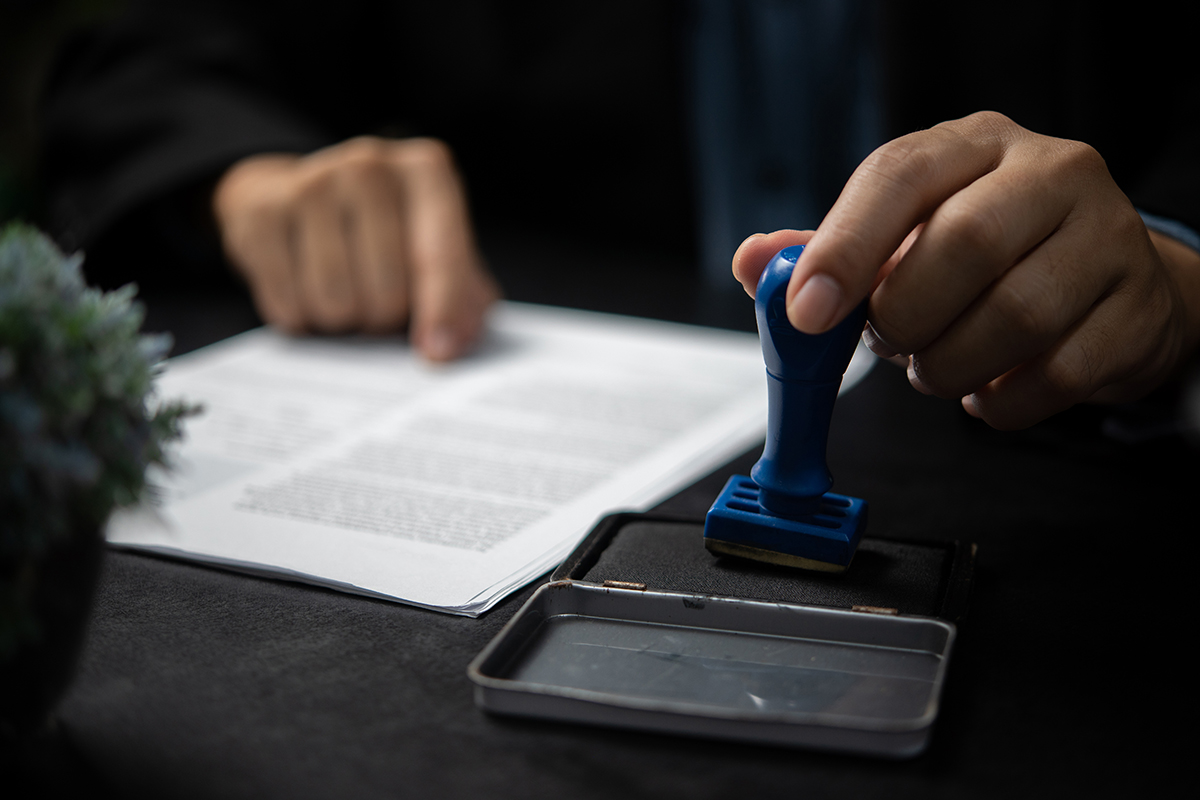A notarized authorization letter is a formal document that grants someone else the authority to act on an individual’s behalf in a legal or official capacity.
Letters of authorization are typically used when a person is unable to be physically present to carry out a specific action and wishes to delegate that responsibility to another person. When a letter is notarized, it signifies that a notary public—an individual authorized by law—has verified the identity of the person signing the letter and has witnessed their signature.
A notary public is an official recognized by the law who has the power to witness and authenticate documents, administer or dispense oaths, and take affidavits. The notary’s seal and signature then serve as proof that the document was signed voluntarily and with proper identification. The notarization aspect adds an additional layer of authenticity and legality to the document. This helps prevent fraudulent activities, making the letter suitable for various purposes, such as legal transactions, financial matters, healthcare decisions, and more.
Notarization offers several benefits due to the formal verification and authentication provided by a notary public.
Here are some of the key advantages of a notarized letter of authority:
Fraudulent prevention and deterrence
Notaries are trained to detect and deter fraud. They verify the identities of the parties involved and confirm that the signatures on the letter are genuine, ensuring that the individuals involved are who they claim to be. This process prevents the authorization letter from being forged or executed under pretenses.
Legal recognition and validity
Notarization adds a layer of legal credibility and authenticity to the letter. As a result, notarized letters often have recognition across different jurisdictions and are widely accepted by different institutions and authorities. This recognition demonstrates that due diligence and compliance were exercised in obtaining proper authorization.
Peace of mind and confidence in delegation
A notarized letter of authority assures that the person granting authority fully understands and intends the actions mentioned in the letter. Notarization also makes the letter legally enforceable, offering legal protection and resolution in case of misunderstandings or disputes that may arise later on. Consequently, this offers peace of mind and confidence when executing such a letter of authorization.
How to Write a Letter to be Notarized: Step-by-Step Guide
Writing a letter to be notarized involves several important steps to ensure that the document is legally valid and ready for authentication by a notary public.
Here is a step-by-step guide to help you navigate through the process:
Step 1: Determine the purpose
First, identify the purpose of the letter. Clearly understand the specific actions that the representative will be authorized to undertake on your behalf. The actions could be related to legal matters, medical issues, administrative tasks, or other areas of concern.
Step 2: Format and content
Select an appropriate format for the letter. Since an authorization letter is a legal document, use a formal business letter format. This format typically requires you to provide a header containing your and the recipient’s names, addresses, contact information, and the date. The header is followed by a subject line that concisely states the letter’s purpose. Next, address the recipient with a formal salutation, using their name and title.
Proceed to draft a statement that explicitly grants the agent the authority to undertake the specified functions on your behalf. Clearly and concisely, outline the specific actions or decisions the representative is authorized to make on your behalf.
Step 3: Include the necessary details
Include any necessary details, such as dates, account numbers, addresses, or any other information relevant to the authorization. Be specific about the scope and limitations of the authorization. These details will help ensure that the authorized person knows exactly what is expected of them. Use clear language to eliminate potential misinterpretations and ambiguities concerning the agent’s role.
Step 4: Signature and date
At the end of the letter, include your signature. Under the signature line, print your name and add the date. This provides a record of when the letter was signed.
Step 5: Notarization statement
A notarization statement, also referred to as a notary acknowledgment, is a formal declaration attesting that the document has been witnessed and verified by a notary public.
EXAMPLE
You can state that the letter requires notarization using phrases like “signed and notarized on [date]” or “this letter must be notarized.”
Step 6: Proof of identity
Before meeting the notary public, gather and organize the relevant documents that serve as proof of your identity. Typically, these documents include state-issued IDs, passports, or driver’s licenses. These documents are crucial for confirming your identity.
Step 7: Meet with the notary public
Once the letter is finalized, schedule an appointment or visit a notary public. Ensure to bring valid identification documents, such as driver’s licenses or passports, as they are necessary for verifying your identity. In the presence of the notary public, sign the letter. Subsequently, the notary will complete the notarization process by adding their signature, seal, or stamp. The date of notarization and the location of notarization (state and county) will also be included.
Free Template
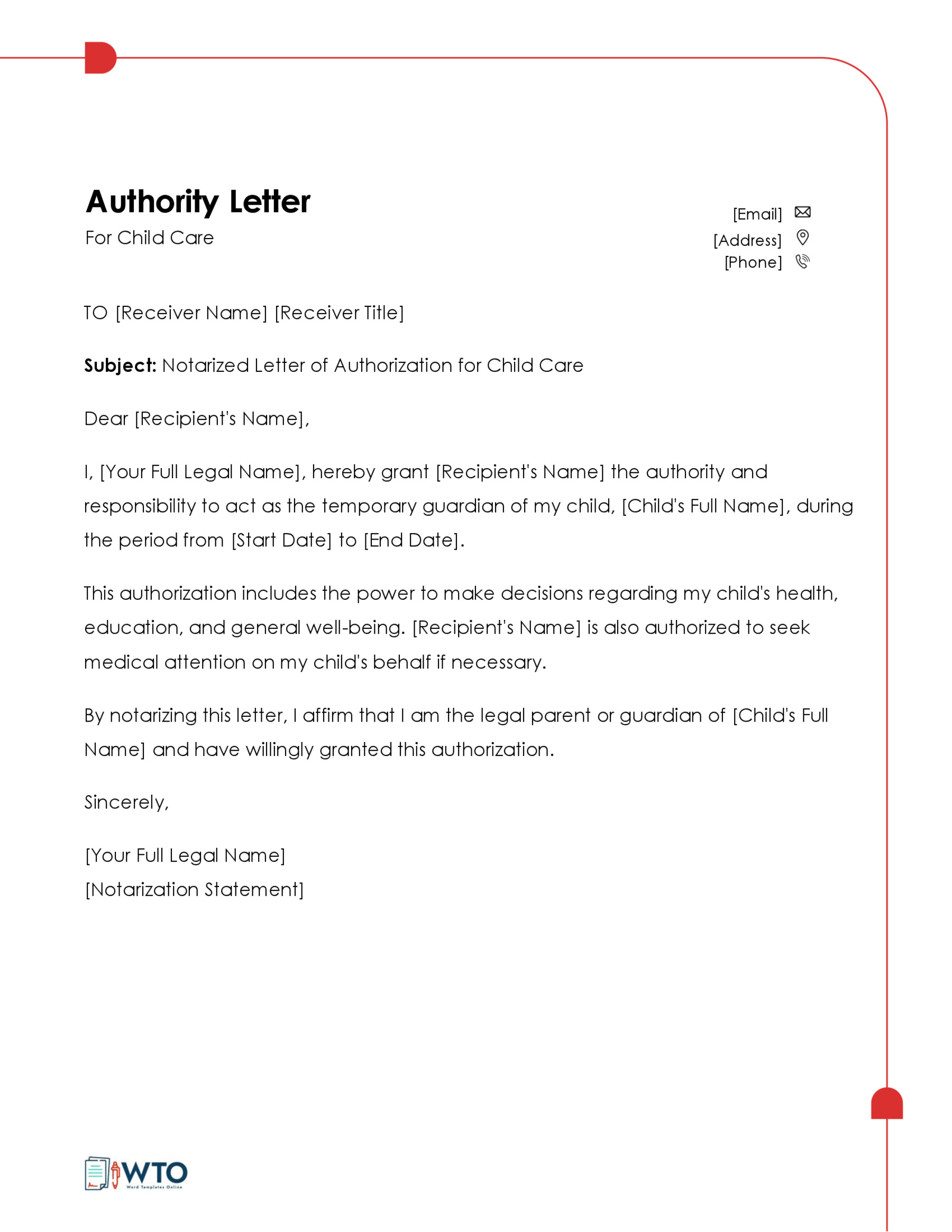
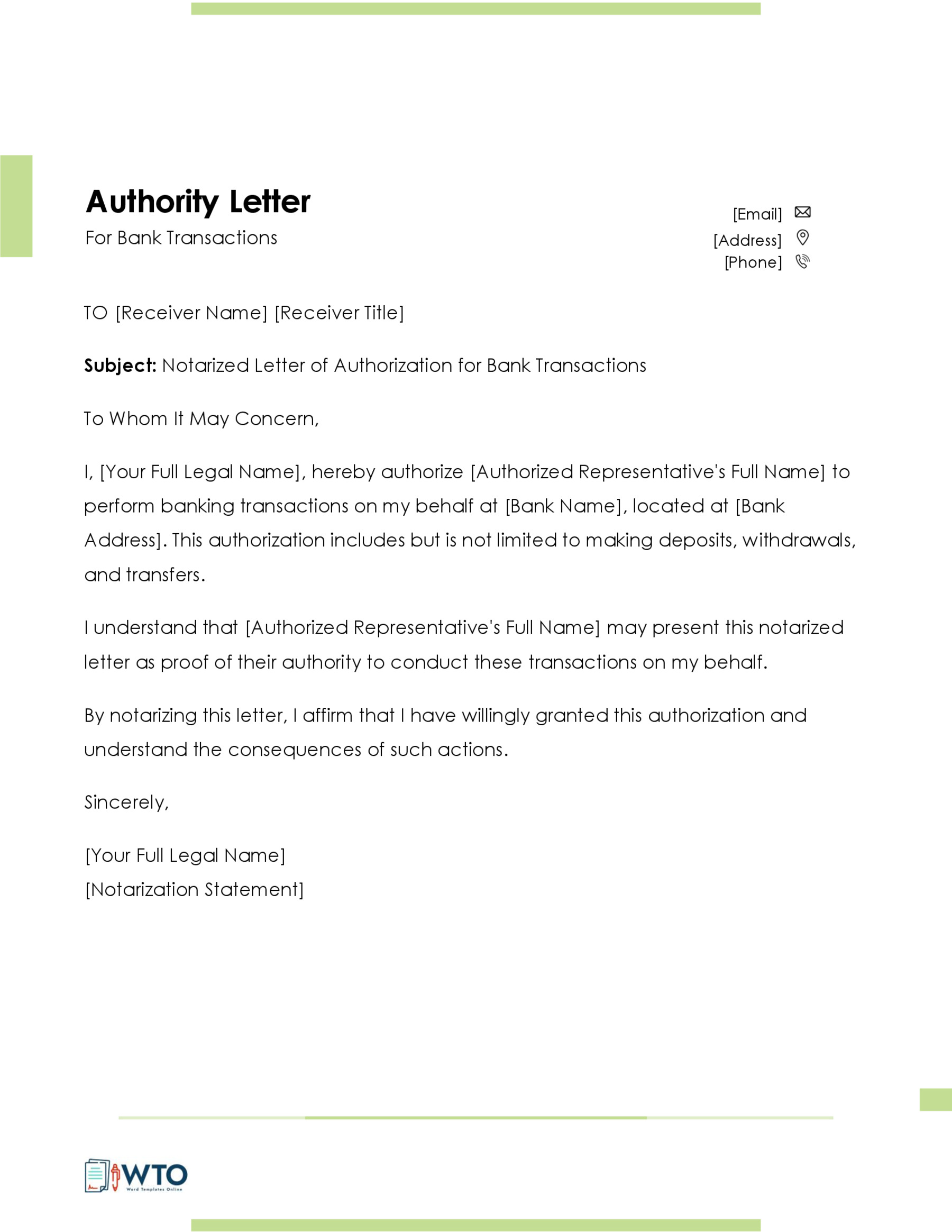
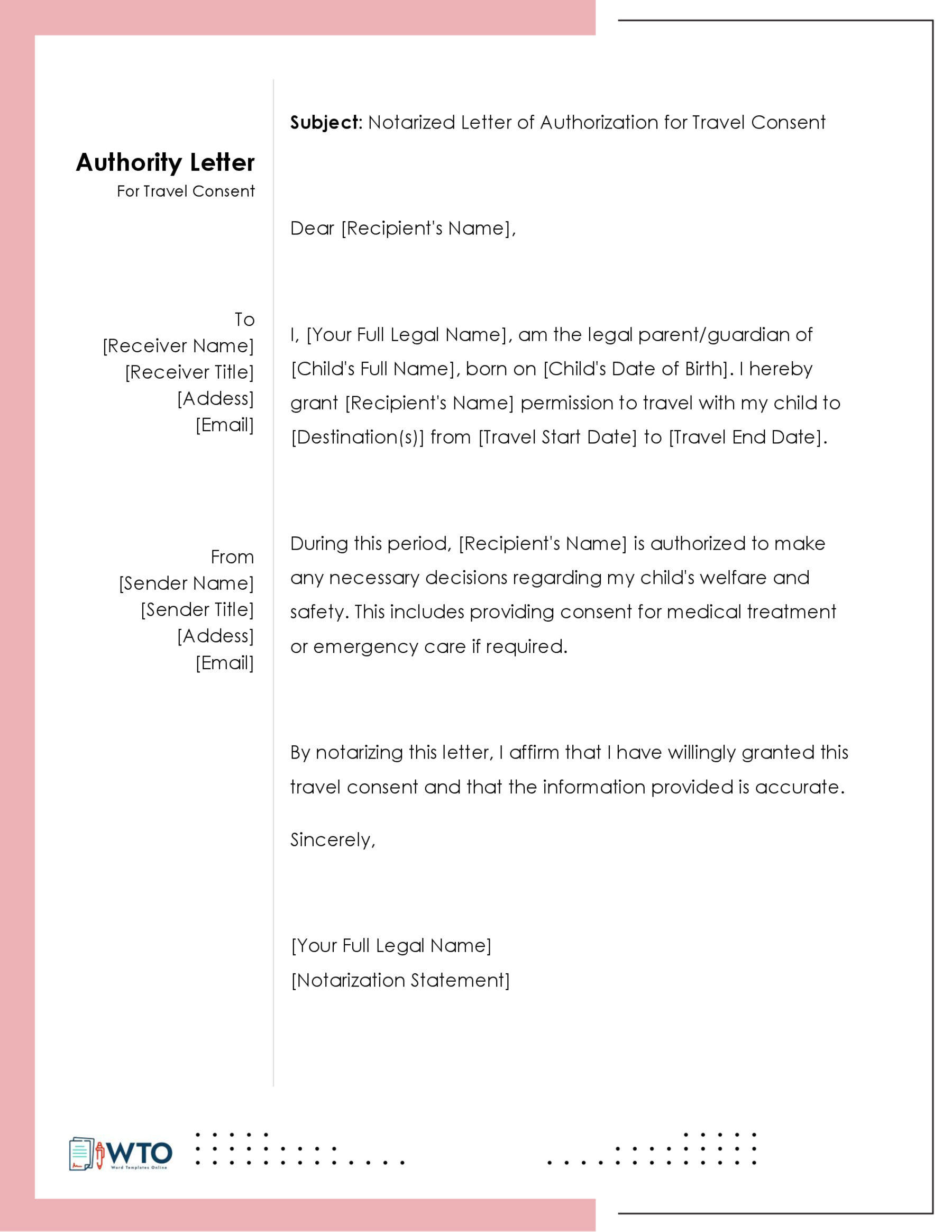
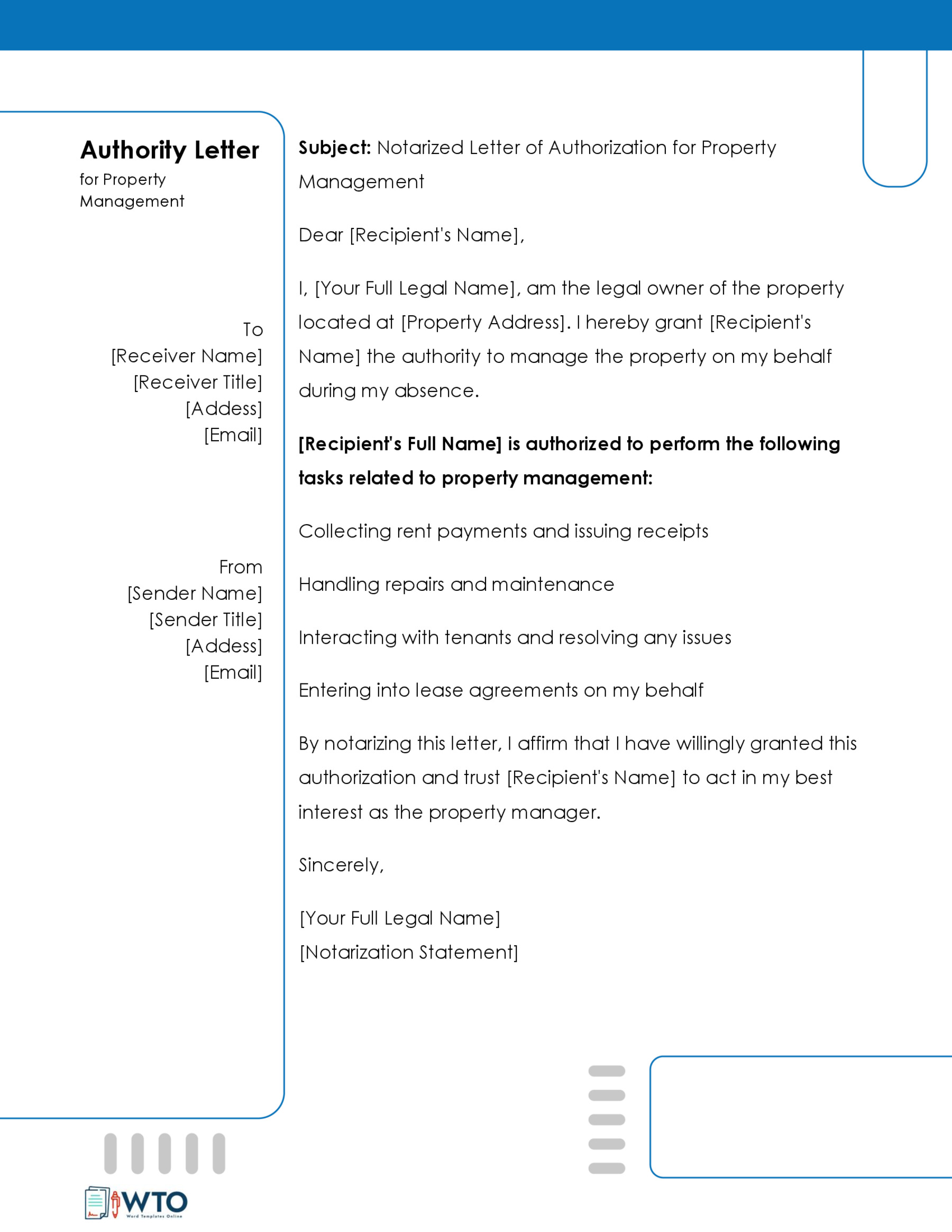
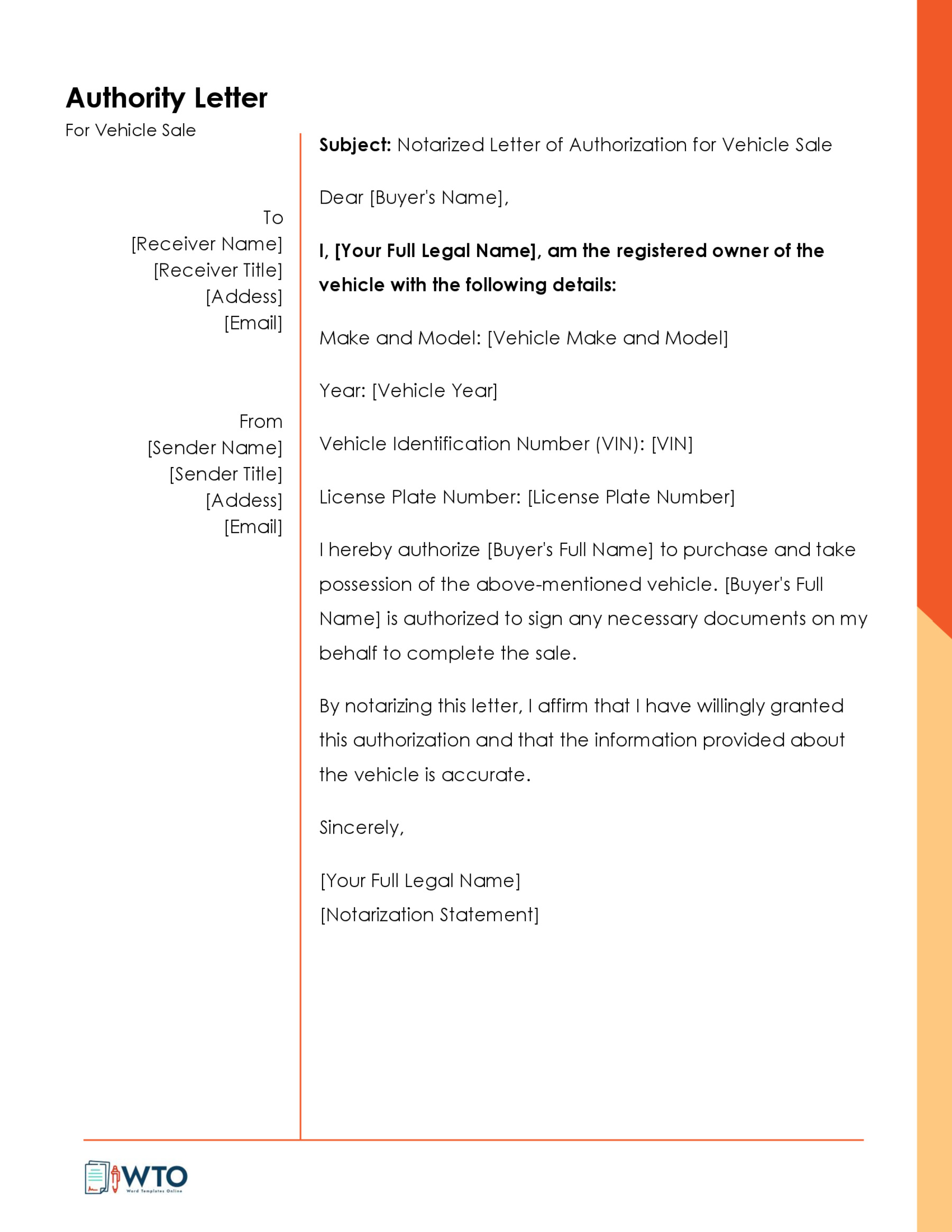
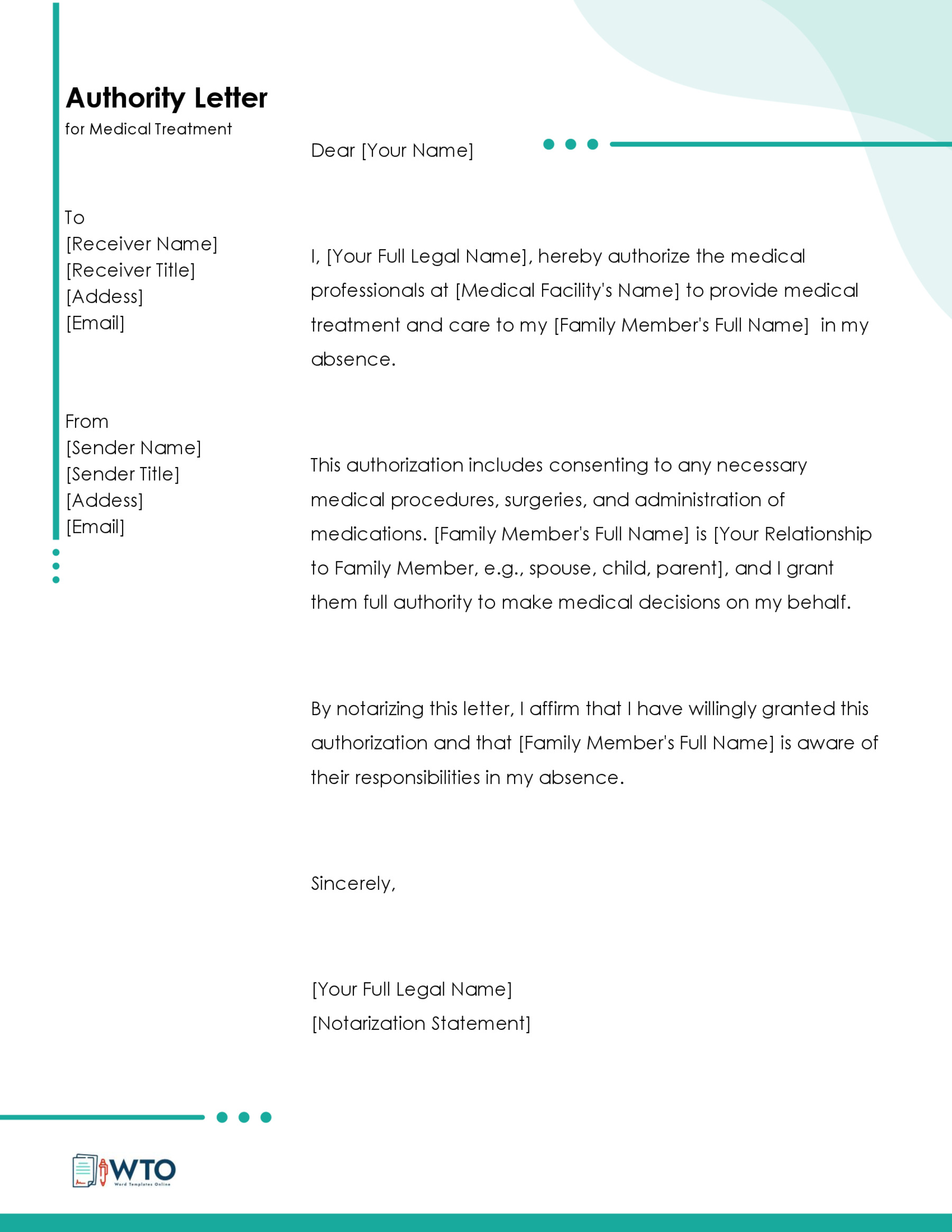
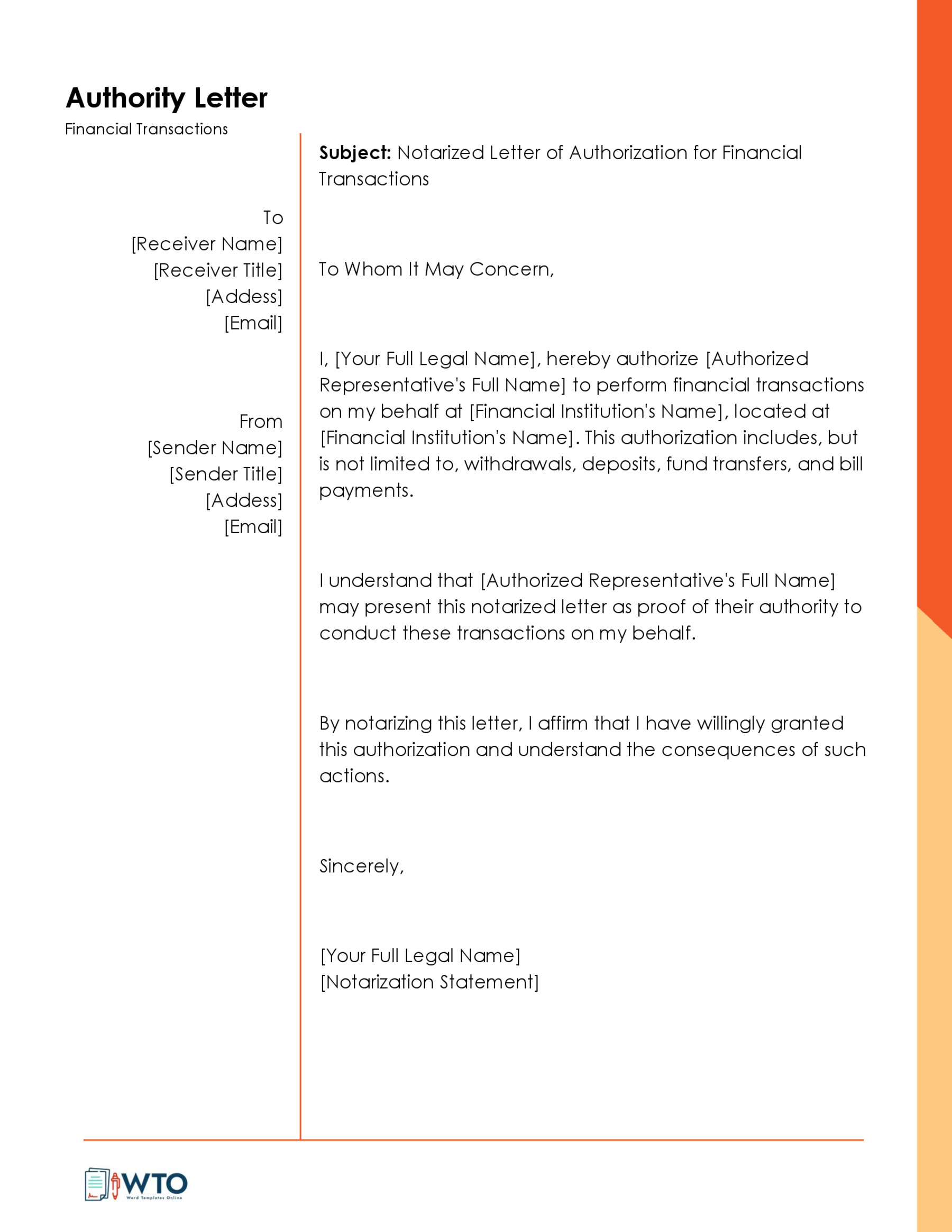
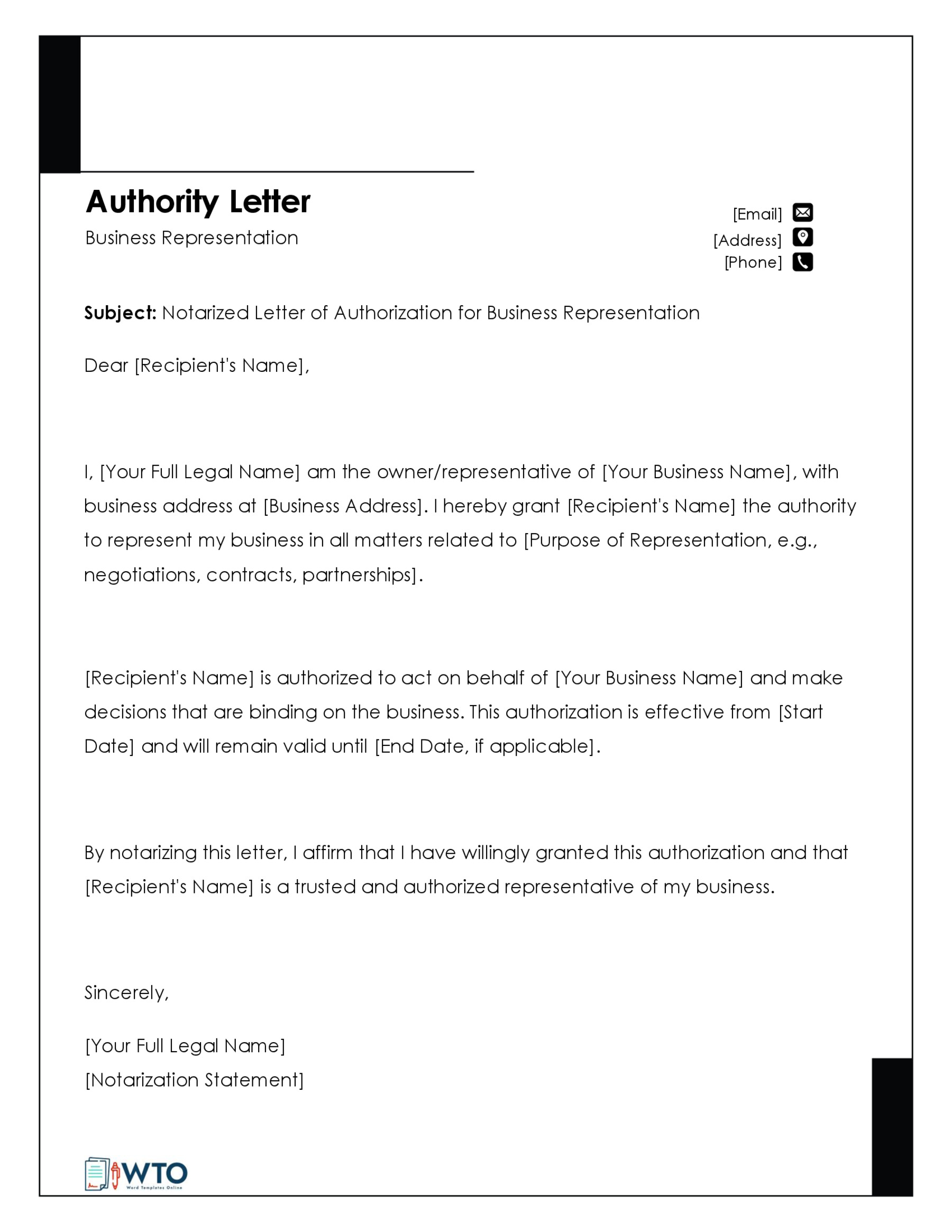
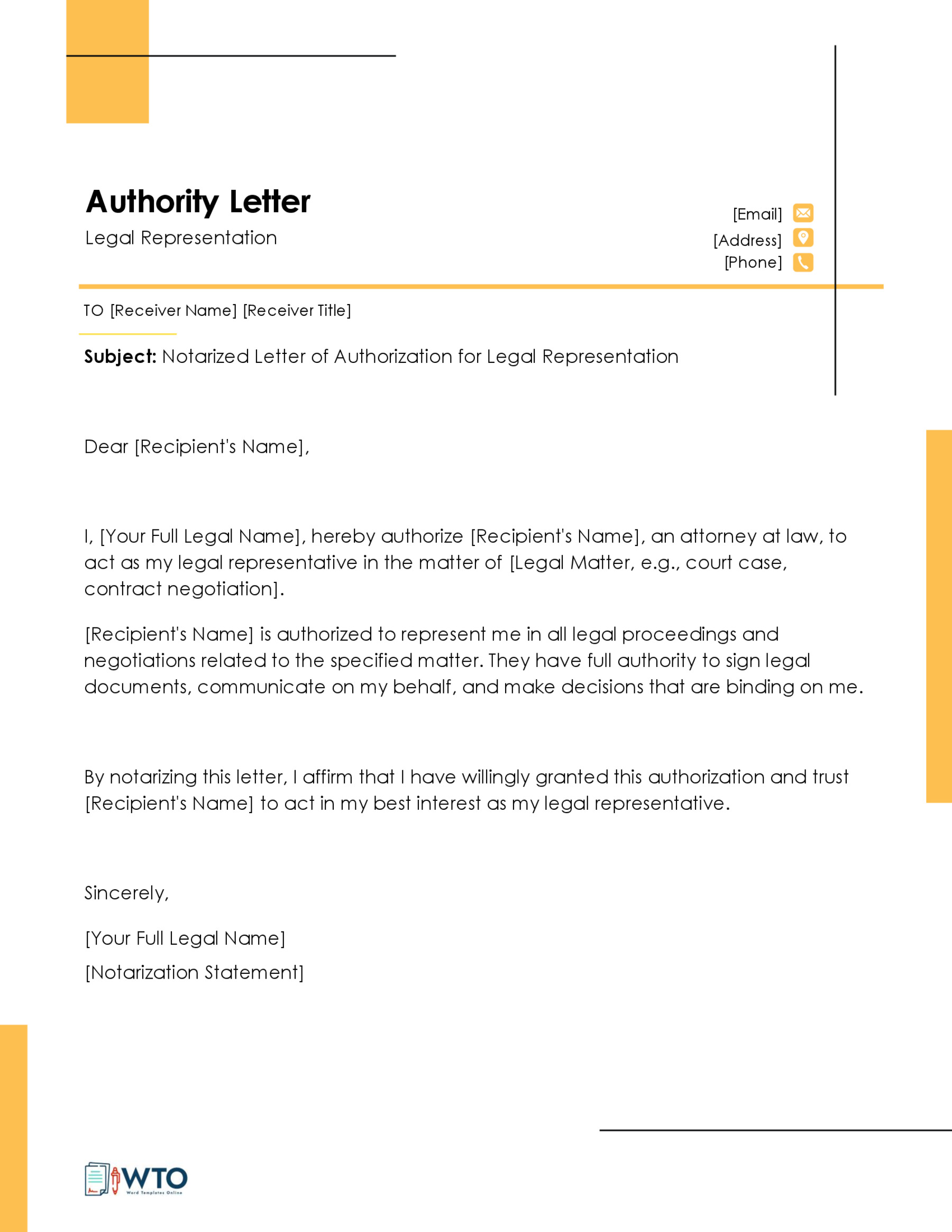
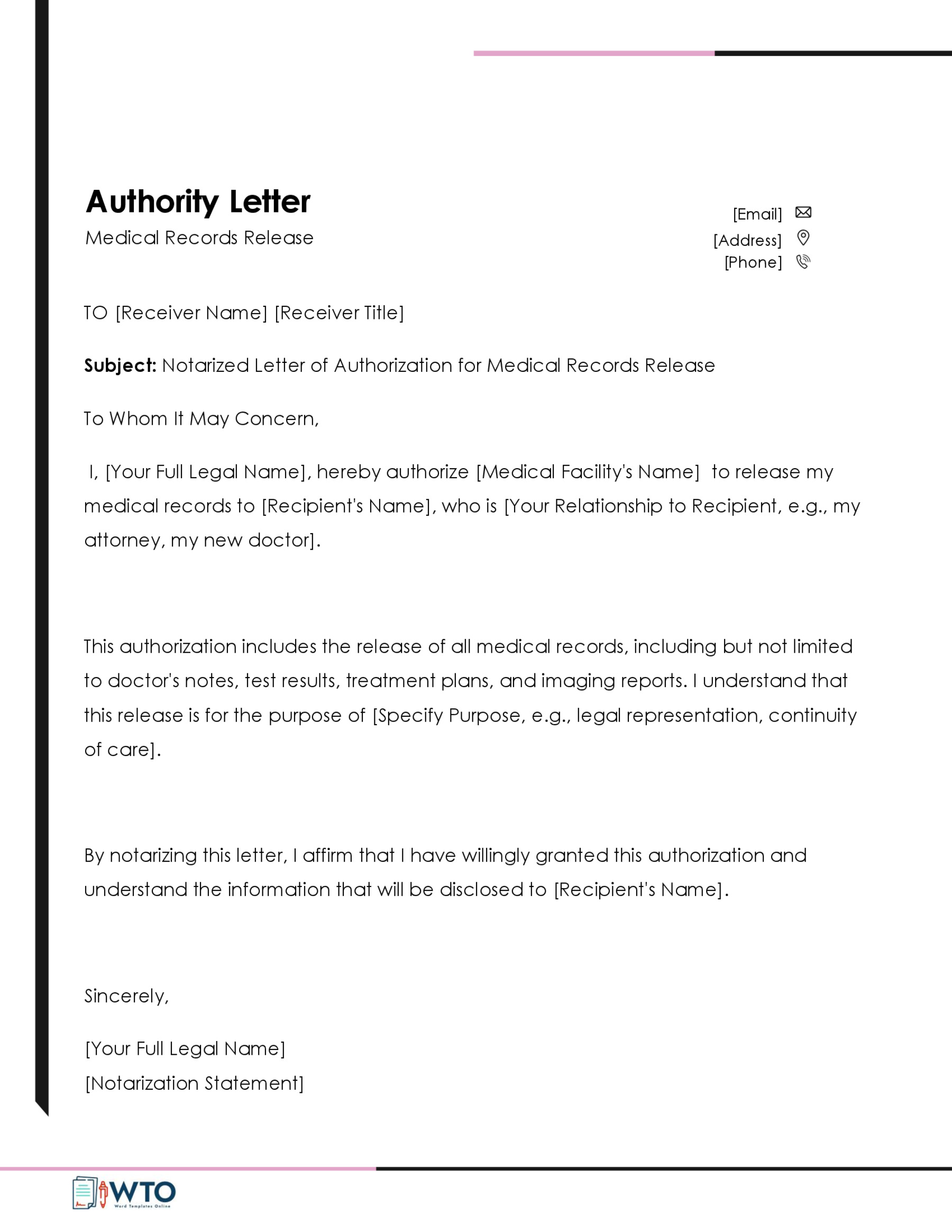
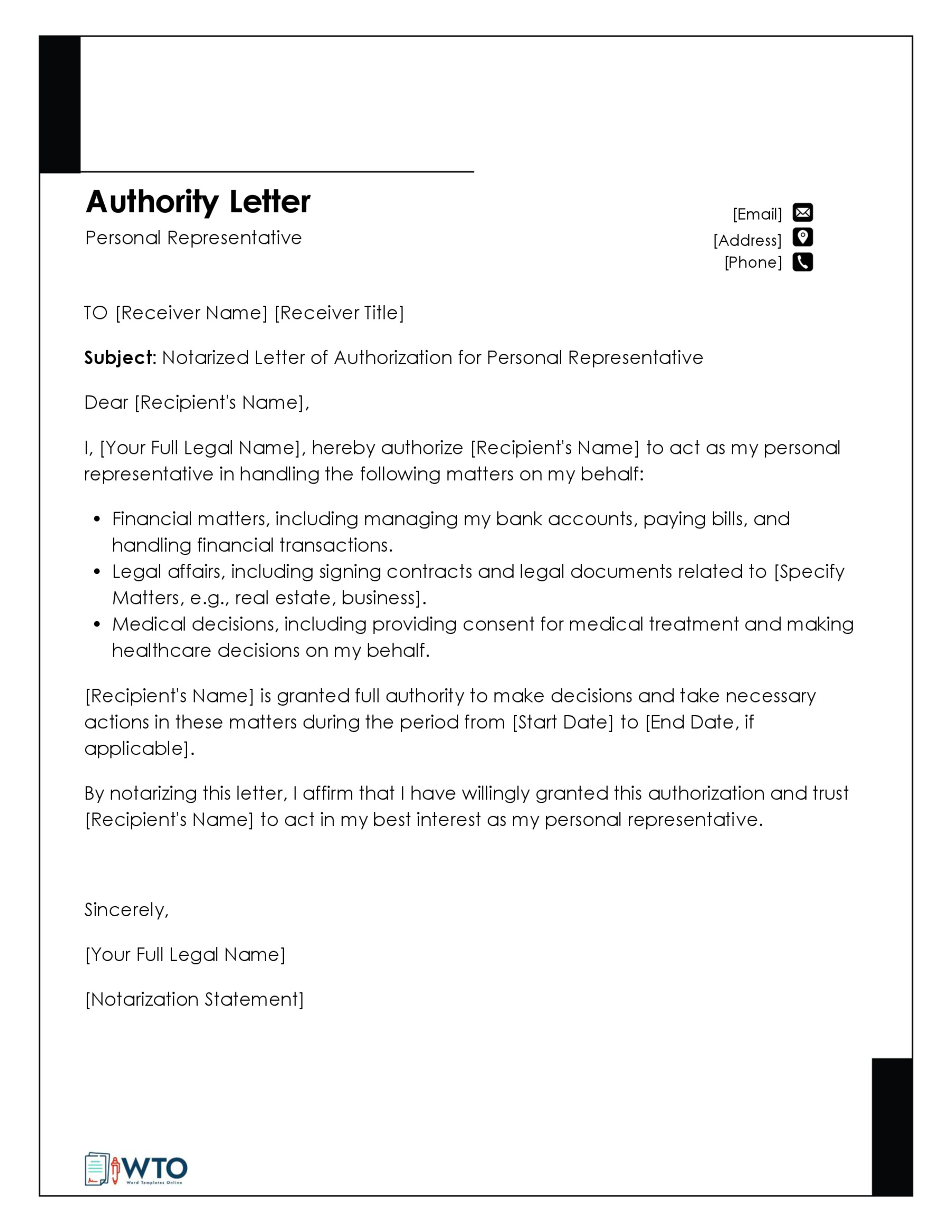
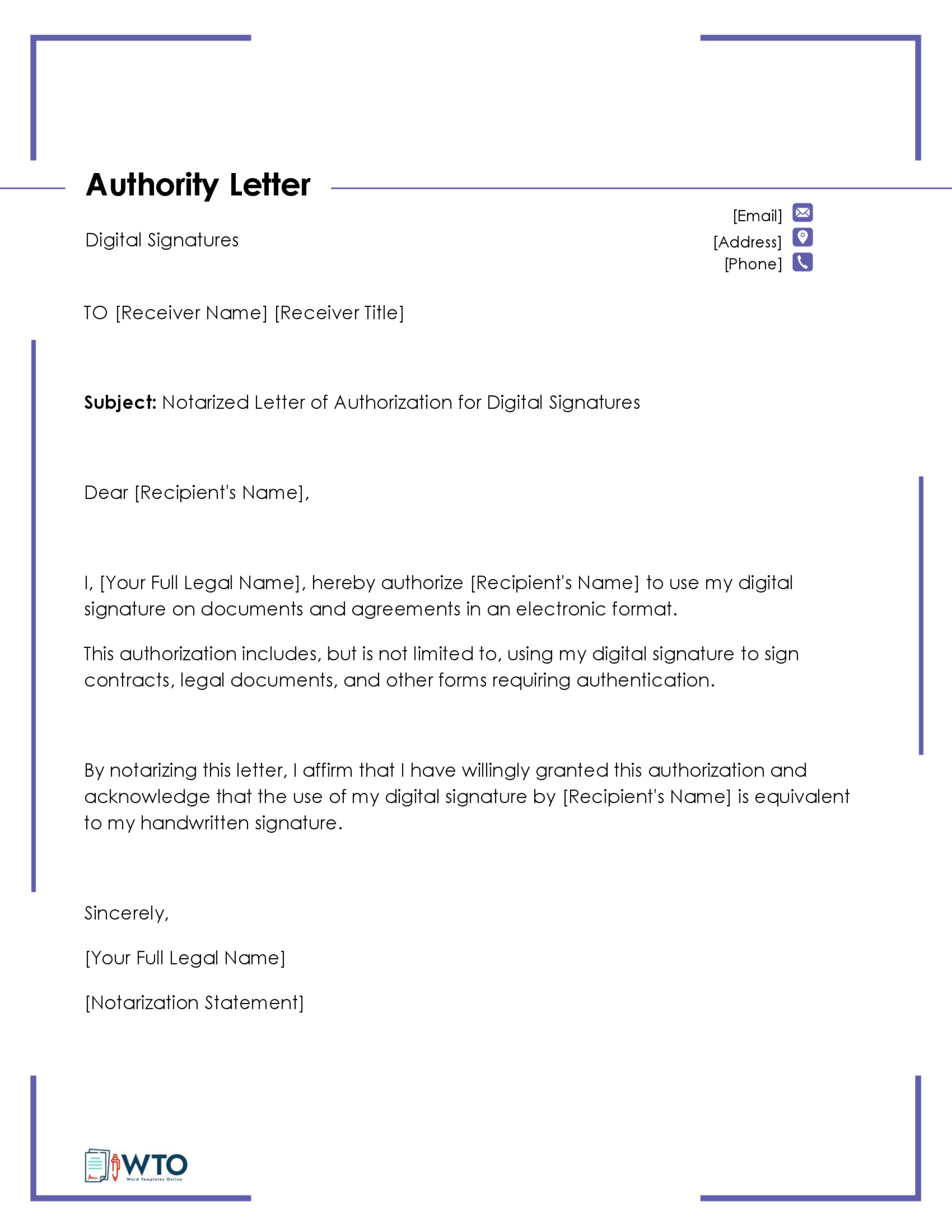
template
[Your Full Name]
[Your Address]
[City, State, Zip Code]
[Your Email Address]
[Your Phone Number]
[Date]
To Whom It May Concern:
Subject: Authority Letter
I, [Your Full Name], residing at [Your Address], do hereby authorize [Authorized Person’s Full Name], holding identification number [ID Number], to act on my behalf in the matter of [specific purpose or documents].
This authorization includes, but is not limited to, the signing of documents, representation in various capacities, and any other actions required for [specific purpose]. I confer upon [Authorized Person’s Full Name] the authority to act in my stead as if I were personally present.
Please recognize the validity of this letter and the authority granted herein. This authorization shall remain in effect until [End Date], unless otherwise revoked or extended by me in writing.
Should you require any further information or clarification, please do not hesitate to contact me at [Your Phone Number] or [Your Email Address].
Sincerely,
[Your Signature]
[Your Full Name]
Acknowledgment by Notary Public
State of ____________
County of ____________
On [Date], before me, [Notary’s Name], a notary public, personally appeared [Your Full Name], known to me (or satisfactorily proven) to be the person whose name is subscribed to the within instrument and acknowledged that they executed the same for the purposes therein contained.
In witness whereof, I hereunto set my hand and official seal.
[Notary’s Signature]
[Notary’s Name]
Notary Public
My Commission Expires: ____________
Sample Notarized Authority Letter
To Whom It May Concern:
Subject: Notarized Authority Letter for Bank Account Management
I, John A. Doe, residing at 123 Finance Avenue, Banktown, BT 12345, hereby grant authority to Jane B. Smith, holding identification number 987654321, to manage my bank account on my behalf.
This authorization includes the ability to make deposits, withdraw funds, negotiate checks, and access account information for account number 123456789 at the Bank of Banktown. Jane B. Smith is authorized to perform all necessary transactions associated with the management of this account.
This authorization is valid from January 31, 20XX, until January 31, 20XX, unless otherwise revoked or extended by me in writing.
For any further information or clarification, please contact me at (555) 678-1234 or john.doe@email.com.
Sincerely,
[John A. Doe’s Signature]
John A. Doe
Acknowledgment by Notary Public
State of Banktown
County of Finance
On January 31, 20XX, before me, Alice M. Notary, a notary public for the State of Banktown, personally appeared John A. Doe, known to me to be the person whose name is subscribed to the above instrument, and acknowledged that he executed the same for the purposes therein contained.
In witness whereof, I have hereunto set my hand and official seal.
[Alice M. Notary’s Signature]
Alice M. Notary
Notary Public for the State of Banktown
My Commission Expires: December 31, 20XX
Final Thoughts
In conclusion, a notarized authorization letter holds significant advantages due to its legal validity and the authentication provided by a notary public. This formal document grants authority to a designated individual, ensuring clear intent, preventing fraud, and establishing a reliable foundation for various legal, financial, and personal transactions. The process of notarization involves drafting a precise letter, specifying the authorized actions, and subsequently visiting a notary public for verification. The resulting notarization statement or acknowledgment serves to validate the document’s authenticity and underscores your informed consent as the authorizing party. This powerful tool enhances the acceptance, recognition, and credibility of the authorization, thus safeguarding the interests of all parties involved in a range of critical matters.


